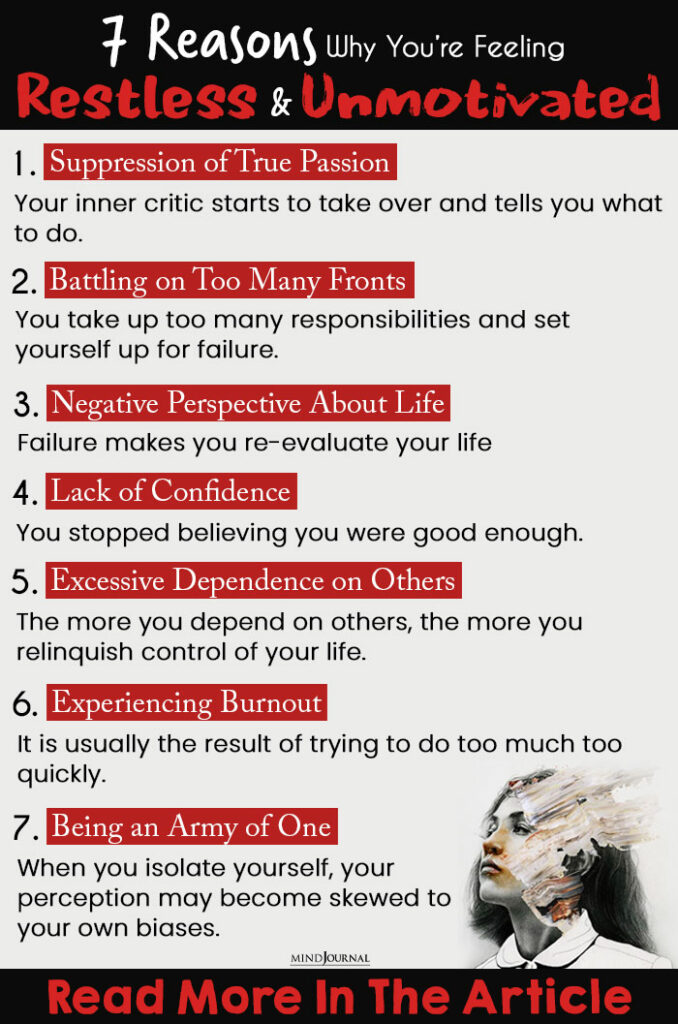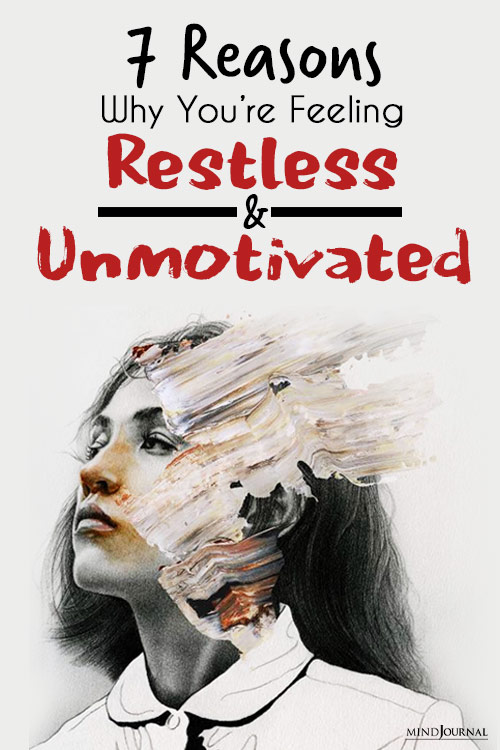When things start to pile up and everything seems overwhelming, feeling restless and unmotivated is inevitable. Find out the reasons behind these feelings. When you feel like you’re losing control over everything, adopt a new perspective to feel differently.
Plenty of people set out each year to change their lives. You may want to lose weight, increase your income, recommit yourself to your faith, or spend more time with your family. Yet, less than 8% of them actually accomplish their resolution.[1] Somewhere along the way, you face an obstacle that leaves you feeling restless and unmotivated.
It is essential to recognize that feeling restless is a normal part of life. Things do not always happen as quickly or as efficiently as you anticipate. Depending on why you feel that way, there is a variety of actions you can take to bounce back in life.
Below are the seven most common causes of restlessness, along with a few strategies to feel peaceful and motivated.
Here Are 7 Reasons Why You’re Feeling Restless And Unmotivated

1. Suppression of True Passion
Everyone has two little voices in their head. One voice belongs to your inner self, while the other is your inner critic.
Your inner self is the voice of your imagination, confidence, and a sense of purpose. This allowed you to march to the beat of your own drum when you were young. If you wanted to play, you played. When you were ready to sleep, you went to sleep.
As you aged, though, you were conditioned to believe that following your purpose made you selfish or irresponsible. Your inner critic starts to take over and tell you why playing it safe is the best option. As a result, you start feeling restless because you need to suppress your desires to please others.
This internal battle is exhausting. Thus, you must be true to yourself all the time. Allow your inner self to guide you and accept the fact that you can’t please everyone.
2. Battling on Too Many Fronts
When they say you can have anything you want, they didn’t mean everything at once. You may be feeling restless and unmotivated because you set yourself up for failure.
For example, you may find it challenging to reduce your spending while trying to eat healthily. Most will agree that healthy eating requires you to spend more money on raw foods, after all. Since your goals run opposite of each other, you must prioritize your goals.
The same would be true if your goal is to earn a promotion and be with your family more. Promotions usually require you to take on more projects while maintaining your current workload. Naturally, you will build efficiencies as you become familiar with the new tasks, but you may need to work overtime on multiple occasions, too.
Related: 15 Signs and Symptoms Of Negative Energy In Your Body
3. Negative Perspective About Life
Failure tends to make you feel like reevaluating your life. The following questions may come to mind as you deal with setbacks:
- Was this really what I was meant to do?
- Should I have played it safer?
- Does this mean it is not for me?
Feeling restless is a natural feeling when you are wondering if you wasted the last few years chasing a far-fetched dream.
The problem with asking yourself, “What went wrong?” is that it will produce a negative answer.
Negative perspectives are difficult to overcome. In truth, it might show you that you could have always done better. That is why so many people never leave the analysis phase of changing their life. Right before taking action, they realize how something can improve, so they end up not doing anything.
Instead of consistently recognizing all that is wrong with the world, start to train yourself to identify what is right in your life. Try asking yourself, “What is one positive outcome of trying and failing?”
4. Lack of Confidence
Somewhere along this journey that we call life, you stopped believing you were good enough.
A quick fix for this cure is to think of something that makes you feel incredibly confident. It could be as simple as your ability to ride a bike or ace a job interview.
Would it be fair to say you have not always had confidence in your interview skills? What changed then?
What changed is the fact that you have secured several jobs over the years. The same idea goes with your confidence in your ability to ride a bicycle.
When you accomplish a goal, doubt vanishes from your consciousness. You no longer feel the need to spend three days preparing for a job interview or researching how to ride a bike. You are confident because you have successfully passed a variety of interview questions before.
You lack confidence and feel restless if you haven’t prepared sufficiently for the task at hand.[2]
5. Excessive Dependence on Others
Depending on other people is not always a bad thing. As an African proverb states, “If you want to go fast, go alone. But if you want to go far, go together.”
When you work with others, you have an accountability partner who motivates you to continue. However, the problem arises when you depend too much on others.
The more you depend on others, the more you relinquish control of parts of your life.
It is comparable to those group projects you had in school. If you don’t like to procrastinate, you will be frustrated by a partner who does not look at the assignment until a week before its due date.
To stop feeling restless and keep others from siphoning your motivation, you need to collaborate with people who share your core values.
6. Experiencing Burnout
Burnout is no joke. It is usually the result of trying to do too much too quickly. You feel as if you have lost time; you want to make up for the last five years in a short time.
A classic example would be someone who has gained 90 pounds over three years and now wish to lose it all in three months.
Is it possible? Sure! But what kind of diet would someone need to maintain in an attempt to lose a pound a day?
Similarly, someone has wanted to start a business for the past couple of years. They have always found a reason to push the date back, but now they feel a sense of urgency. They slave away in their day job and work and work on the business all night, causing them only to get an hour of sleep.
You may undoubtedly feel like things are finally progressing in the right direction, but how long can you keep this pace up?
When you eventually burnout, you will be feeling restless, significantly when your gains slowly erode. Because of that, you need to maintain a realistic timeline for your goals. Remember: You are building a life-changing habit, and that takes time.
Related: How To Recover From Burnout When You Feel Unmotivated
7. Being an Army of One
Whether it is difficult for you to trust others or you are attempting to conceal your setbacks, secluding yourself is a recipe for disaster.
There is a reason why the best among us have coaches and mentors. Seeing things from a different perspective is beneficial, especially if it’s from an expert at achieving the same goals you set for yourself.
Too often, when you isolate yourself, your perception may become skewed to your own biases. From the numerous studies regarding diversity, one highlights the increased returns created by a diverse board versus one that lacks diversity.[3]
Sometimes the only thing you are missing is the ability to run an idea by someone else. Not even that you need them to create the concept, but there is a benefit to talking things out with others. Don’t take the burden on yourself. Outside of feeling restless and overwhelmed, your results may suffer.
Final Thoughts
The first step to stop feeling restless and unmotivated is to acknowledge something did not go quite as planned.
Whether you set an unrealistic timeline or you face an unforeseen setback, recognize you need to make an adjustment. This allows you to stop holding onto the past so that you can propel into the future.
Feelings of helplessness and hopelessness tend to drain your motivation. You will find success by allowing yourself to make adjustments as you gain additional insights and knowledge. Remember: your past doesn’t dictate your future if you change the actions that have created your past results.
References:
[1] INC: Science Says Only 8 Percent of People Actually Achieve Their Goals. Here Are 7 Things They Do Differently
[2] Forbes: Use It Or Lose It: The Science Behind Self-Confidence
[3] McKinsey & Company: Is there a payoff from top-team diversity?
Written By Undre Griggs
Originally Appeared In Lifehack
Feeling restless and unmotivated at times is a part and parcel of life, but if you are constantly feeling like that, then it’s a hint that you need to change a few things. You need to understand the source of the problem and make the necessary changes to your perspective, mindset, and insight. It is only when you work on your present, will you be able to achieve success in the future.










Leave a Reply
You must be logged in to post a comment.